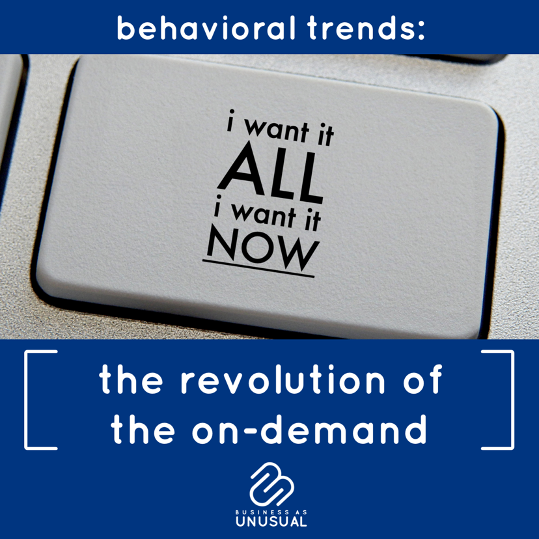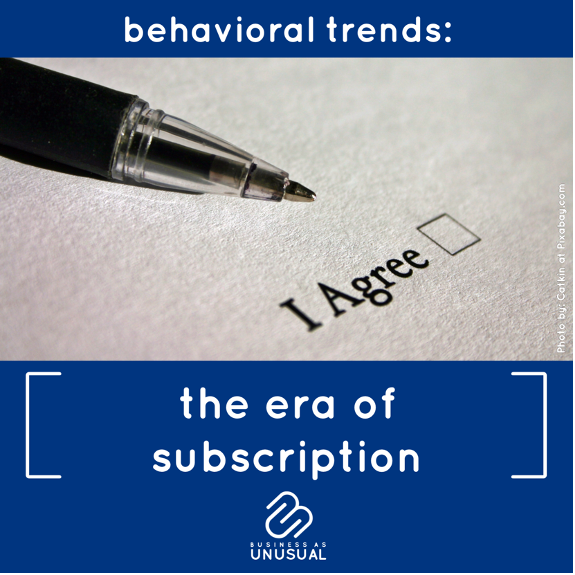“It is not the most intellectual of the species that survives; it is not the strongest that survives; but the species that survives is the one that is able best to adapt and adjust to the changing environment in which it finds.” — Leon C. Megginson
With every new technological and scientific advance that becomes mainstream, old paradigms are questioned to give way to new standards in all personal and commercial areas. New business models emerge every day, new ways of displaying our products, new ways of buying and using them, new ways of informing and entertaining ourselves. We live in an era of rapid change; overnight entire industries are revolutionized as consumers adopt new habits.
To be creative and adapt to these challenging times, we must think outside of the box, internally and externally, about the way we conduct our businesses. If consumers have massively changed some habits, it is probable that our collaborators too, and we can take advantage of those changes in favor of our organizations. A more efficient way to manage the resources of our companies and even, in some cases, avoid the deadly fixed costs during times of turmoil and beyond. It’s a good moment to rise questions like…
Do we need physical offices?
With the digitization of our lives, many people have become urban nomads and are able to work seamlessly with their smartphones and laptops from wherever they are. From a coworking to a cafeteria, from our own homes to a taxi, today many companies can live without the cost of maintaining a physical space. Nowadays we have plenty of options like:
– Home office tools, management of calendars, emails and shared chats. Platforms for project management and control. And great internet connections at home.
– Digital telephony and video conferences. Spaces for virtual meetings.
– Coworking spaces with very flexible plans.
– Crowdsourcing of meeting spaces on-demand, apps with which you can rent an office or a meeting room for a few hours at a very reasonable cost.

Additionally, a whole culture has been generated around flexibility and the efficient use of time, how to organize our workspaces and our schedule. How to better share information and collaborate. Avoid distractions, so that our employees are more productive.
Do we need employees?
Many companies are also opting for more flexible schemes when it comes to “hiring”, rather looking for the figure of partners, associates or providers of a particular service for a specific time. Staff Augmentation is one of the disciplines that handles this, setting up ad-hoc, remote, multidisciplinary work groups for a specific project under a very strict and controlled plan. They work for us, but they are not on our payroll.
Another option that is becoming increasingly popular is to hire startups, small companies that provide specific services such as product delivery, information gathering or transportation of goods. The same old outsourcing revamped with collaboration, youth and drive in this new era of entrepreneurship.
Do we need assets?
Many new brands have even taken advantage of the crowdsourcing boom to position platforms and services without even having the assets to operate them. Nowadays, if someone wants to go from place A to place B, all he has to do is open an app like Uber or Didi on his smartphone and ask for a transportation service. The driver who will come for him is someone who does not even work for the company. The car that picks him up does not belong to that platform either. And yet, without owning any vehicle, they transport millions of people every day.
In the same way, there are companies like Airbnb or Breather through which anyone can rent a space, a complete apartment, a house or an office, for a specific moment, avoiding traditional hospitality systems and other old real estate paradigms. In the world there is an enormous amount of resources in private hands that, thanks to the new digital world, can be in the hands of anyone. We can rent cars, rooms or talent. Resources for any job we can think of, waiting to be used, only when needed.
Do we need inventories?
And if we don’t need to spend on resources, maybe we don’t need to spend on inventories either. The old paradigm of “First produce, then sell” died to give way to something more modern and efficient “First sell, then produce”: The On-Demand Business Model.

This is a paradigm that is being applied in various industries. There are already companies that fabric the t-shirts or print the books, in real time, when consumers buy them. Instead of big car factories or brick kilns, the world is experimenting with 3D printers to make almost anything, at the moment, avoiding unnecessary use of resources and waste. Everything revolves more and more around the consumer and the moment of purchase, wherever it occurs.
Do we need stores?
Retail is dead … Long live e-commerce! The old supremacy of the physical store has gradually surrendered to the convenience of online shopping. From travel agencies to bookstores, through car sales and now to the supermarket, it is an irreversible trend that we can take advantage of in our favor. A good digital strategy and out-of-the-box resource planning and processes can successfully convert our companies to e-commerce in the blink of an eye.
The main objection that has been raised in the past around the digitalization of retail has actually nothing to do with technical capabilities: it’s a matter of customer experience. In many categories, users won’t buy a product without trying it first, how it feels and looks on them. Faced with this objection, e-commerce has responded with easy return mechanisms. In this way, shoppers can order the shoes in a certain size or color, and try them on when they receive them in the comfort of their home (with many tangible advantages). And if they are not satisfied, they can ask for the exchange or return immediately, no questions asked.
Do we need capital?
To start a business and maintain it, of course we have to have a constant flow of cash and the financial capacity to sustain its growth, be it arithmetic or geometric. This has not changed in our capitalist world.
To maintain arithmetic growth, the key is a constant flow of customers, and even better if they are recurring. Many industries have opted for the subscription model over the old pay-per-event model. All the music you want to listen to, all the videos you want to see, for a fixed monthly amount. There are airlines and stores taking advantage of this model too, subscription paid in exchange for exclusive benefits. Loyalty is no longer bought, it is sold. Even in industries such as agriculture, there are already models in which consumers subscribe to receive their vegetables at home every week without having to go to buy them: straight from the garden to their home. Consumers are getting used to subscribing to all kinds of services and products, and that’s good for business.

On the other hand, to opt for geometric growth, there are many funding options out there. One of the most popular is crowdfunding, in essence a model where many people can put small amounts of money into our project or company, in exchange for a percentage of our success. Many companies have taken this path and many startups have been funded, becoming very popular overnight without even using advertising.
Do we need advertising?
We have moved from the era of the Unique Selling Propositions to the era of the Unique Value Propositions. Nowadays, wherever users perceive value, something that solves a problem or improves some aspect of their lives, they will buy it, use it and recommend it to everyone. That is the key.
Many of the platforms that consumers have adopted today, for information, entertainment, transportation or accommodation, have come to them by the recommendation of others. The long-sought word-of-mouth has become our daily bread, for better or for worse, via social media and instant messaging. We live in a society of constant communication where sharing, the good and the bad news, has never been so easy. If we do well with our companies and deliver something good and valuable out there, users will appreciate it and will let their peers and friends know about it.
The global economy is currently under stress and revision, so should be the business world in general. Crisis and traumas are always good times for reflection and decision-making. Let the current events be the perfect excuse to modernize our companies and question many of the paradigms we learned in business schools. At the end, it won’t be the biggest nor the strongest who survive, but those of us who are able to adapt and reinvent ourselves. See you in the future.






